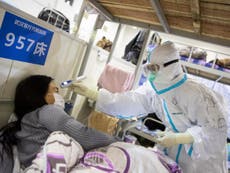Coronavirus: Another pandemic could be around the corner, expert says
UK ‘prepared for the wrong exam’ with Covid-19, University of Edinburgh professor says as death toll hits 100,000
Your support helps us to tell the story
From reproductive rights to climate change to Big Tech, The Independent is on the ground when the story is developing. Whether it's investigating the financials of Elon Musk's pro-Trump PAC or producing our latest documentary, 'The A Word', which shines a light on the American women fighting for reproductive rights, we know how important it is to parse out the facts from the messaging.
At such a critical moment in US history, we need reporters on the ground. Your donation allows us to keep sending journalists to speak to both sides of the story.
The Independent is trusted by Americans across the entire political spectrum. And unlike many other quality news outlets, we choose not to lock Americans out of our reporting and analysis with paywalls. We believe quality journalism should be available to everyone, paid for by those who can afford it.
Your support makes all the difference.Another so-called Disease X capable of causing a global pandemic could be just around the corner – and is a matter of when, not if, a leading epidemiologist has warned.
Scientists have been discovering new viruses capable of infecting humans at a constant rate for the past 50 years, finding one or two new viruses every 12 to 24 months, said Professor Mark Woolhouse.
Speaking as the UK’s Covid-19 death toll rose above 100,000, he said: “That's going to keep happening.
“It's picking up the ones that are actually going to cause the next pandemic out of this constant trickle of new viruses that's coming along.
“Occasionally one comes along, so spotting the rare event is always hard.”
Asked if the next Disease X could potentially be around the corner, Prof Woolhouse said “absolutely”.
Speaking independently, the University of Edinburgh professor of infectious disease epidemiology said: “You could use the phrase ‘it is when, not if’. We can't put a handle on when, of course.
“The precise mechanism by which a virus comes out is always extremely unpredictable. You can never predict precise events, so you have to do it on sort of statistical grounds of probability.”
Disease X is the World Health Organisation’s (WHO) term for a previously unknown pathogen which emerges and spreads around the globe – as has happened with Covid-19 – and was added to the UN agency’s priority list for the first time in 2018.
According to Prof Woolhouse, he and some colleagues were approached by the WHO in 2017 and asked to add Disease X to its list of priority diseases.
The experts met the following year and – suspecting that the “most likely scenario” was that the next emerging pandemic would be caused by an as-yet-unknown disease – decided that one possibility was a novel coronavirus related to Sars or Mers.
“I mean, it really couldn't be more accurate than that,” he said. “This new virus is so closely related to Sars, so they absolutely pinpointed it as one of the threats.”
Despite this foresight, Covid-19 has claimed well over 2 million lives in the 10 months since the WHO declared it a pandemic, with more than 100 cases identified worldwide.
Asked if there was now a greater appetite among policy makers to be aware of the risk of future pandemics, Prof Woolhouse said: “I'm not sure that there's a lot of thinking going on about the next threat, while the world is concentrating full tilt on dealing with the one it's got.
“I absolutely agree that there needs to be more thought about that.”
He added that the UK actually had “pretty mature and sophisticated plans” to react to the next influenza pandemic.
“Unfortunately, I like to put it, we did a lot of work, we did our revision, we went into the exam room, and they gave us the wrong paper.
“We were all prepared to meet the pandemic flu, and we got something else. And that I think for me is the big lesson – I have tried to push this for many years now – is don't be overly prescriptive about what you think's going to come next.
He added: “We absolutely do need to be more aware of these events, but I think this game of trying to guess what it will be is very risky.
“We just played it, and it didn't do us any favours. We prepared, as I say, for the wrong exam, and we don't want to do that next time.”
Additional reporting by PA




Join our commenting forum
Join thought-provoking conversations, follow other Independent readers and see their replies
Comments